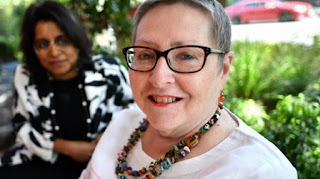Executive Director - Euthanasia Prevention Coalition
 |
| Julie Morgan |
the past four years have given me a unique window into the complexity of death and dying, of living and loving, and of holding on and letting go.Morgan first explains her personal life experience:
The doctors have told me I have a few months to live. The cancer that began in my breast four years ago has spread to my spine, ribs, hips and, more significantly, to my lungs. The surgeries, extensive chemotherapy, and radiation that I went through back then, plus the on-going hormone therapy, didn't do the trick. And so now, in my mid 50's, I'm terminally ill. It often doesn't seem real, yet it is. But there's so much more that I want to do – I am not ready to go!Morgan expressed why the euthanasia debate scares her:
The debate worries and scares me on several levels. Fortunately we just don't go around killing each other any more, so the notion that it's a person's "free choice" to die just doesn't make sense. Recognising the full scope of human dignity, we stopped capital punishment a long time ago. Now bringing in legislation that allows a group of experts to determine who can "legally" die, seems a retrograde move. Intellectually, that worries me. And once the legislation has been approved, experience tells us that it is likely to grow exponentially. I can imagine a time when particularly frail and vulnerable people will succumb to the thought that it might be best for their families and for society in general for them to let go and die – they will agree to something because they think they ought to. That scares me.Morgan concludes her article by defining what true death with dignity is:
I have always been an extremely private person, so the thought that my increasingly frail body will need intimate help does not thrill me. But just as I cared for and loved my friend in all her messiness and fragility, I will have to let others care for and love me in the same way. There is nothing undignified about that. So my experience of being a primary carer tells me that as I'm dying, the presence of people who have the emotional capacity to sit with me during long hours, who have the strength to continually stroke my arm, to bring me cups of water in the night, to tell me that they love me and to stay with me even if it seems that I am no longer present to them is of beyond measure. I'm sure that I will know their voices, and that I will know their touch. So as the doctors relieve my physical pain, I trust that my family and friends will abide with me so that just as I have lived, so will I die, with integrity and grace.In November 2016, South Australia debated and defeated a euthanasia bill and the Australian Medical Association re-affirmed its opposition to euthanasia and assisted suicide.
Paul Russell and Hope Australia have once again prepared an effective opposition to the proposed euthanasia legislation. Thank you Julie for expressing your real fears about euthanasia.

1 comment:
Good on ya Australia.
Post a Comment